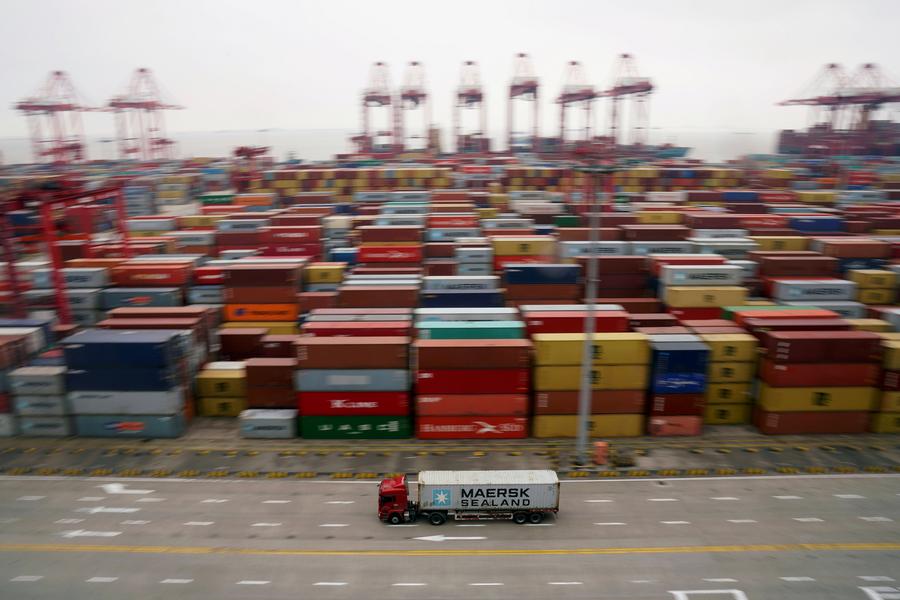Trump's tariffs will harm US businesses, intl trade framework, experts warn


NEW YORK - The US government's latest move to impose new tariffs on select Chinese goods and restrict imports will only harm US companies as well as the international trade framework, experts and industry insiders have said.
The United States on Friday announced additional tariffs of 25 percent on Chinese imports worth approximately $50 billion, going against the consensus reached in bilateral economic and trade consultations.
In response to the announcement, China said it would impose additional duties of 25 percent on 659 items of US products worth about $50 billion.
US businesses impacted
The Dow Jones Industrial Average opened sharply lower on Friday after the news came out and fell as much as 280 points in intraday trading.
Shares of Boeing and Caterpillar dropped 1.25 percent and 2.04 percent respectively on the last trading day of the week. The two stocks are sensitive to trade tensions as a large part of their businesses comes from overseas.
Matthew Cheslock, an equity trader with Virtu Financial, said the real question is whether there will be a second round of tariff measures. He said people would be more concerned if there is a second round because that would mean the two sides are no longer just negotiating, and the measures would actually be put into action.
The Trump administration said additional tariffs will be levied on some $34 billion worth of Chinese products from July 6. Meanwhile, the other $16 billion worth of Chinese products will undergo further review.
Cheslock said a lot of jobs could be affected in the long run, especially in construction, automobile and farming.
Various US industry associations have voiced concern about their government's protectionist policies.
On Thursday, agricultural associations including the American Soybean Association (ASA), the National Association of Wheat Growers, and the National Corn Growers Association issued an appeal to Congress to stop the tariffs.
"After weeks of engaging with the Trump Administration to gain insight into the future of trade tariffs, agriculture producers and related industries dependent on exports to China are turning to Congress for help," the associations said in a joint release titled "We Need Trade Not Tariffs."
Davie Stephens, a Kentucky soybean grower and ASA vice-president, was among the growers distraught over the prospect of fresh trade tariffs.
"As a soy grower, I depend on trade with China -- China imports roughly 60 percent of total US soybean exports, representing nearly one in three rows of harvested soybeans," Stephens said.
Soybeans are one of the several crops that could see steep and lasting impacts if China retaliates against US tariffs.
Statistics show that the United States exports about $14 billion worth of soybeans annually to China.
Distorting world trade order
Analysts warned that the United States' growing protectionist measures will distort the world trade order.
Edward Alden, a senior fellow at the Council on Foreign Relations, said there are different voices within the Trump administration. While Treasury Secretary Steven Mnuchin was opposed to a trade fight, President Donald Trump is not "flip-flopping" on his trade policies and has been clear all along that this is what he intended to do.
"I am deeply worried about the international trade framework. This is not a bluff -- the threats on both sides are real. And this conflict is being carried out outside the rules of the WTO and other trading arrangements. We have not seen a trade conflict of this sort in many decades," Alden told Xinhua.
Greg Valliere, chief global strategist at Horizon Investments, told the media a trade war would lead to the United States' estrangement on the global stage.
Former Federal Reserve Chairman Alan Greenspan on Wednesday sharply disputed the notion that the United States was being ripped off by other countries because of its trade deficit -- Trump's argument for imposing tariffs on US trading partners.
Greenspan told US news channel CNBC that the United States is on the edge of a trade war and the presumption that foreigners are ripping the country off is nonsense.
The Trump administration's measures to impose new tariffs and restrict imports are likely to "move the globe further away from an open, fair and rules-based trade system, with adverse effects for both the US economy and for trading partners," the International Monetary Fund (IMF) said in a report on Thursday.
The IMF said the tariffs imposed or proposed by the Trump administration also risk "catalyzing a cycle of retaliatory responses from others, creating important uncertainties that are likely to discourage investment at home and abroad."
It could interrupt global supply chains and damage a range of countries as well as operations of US multinational companies, the Washington-based international lender said.
Such measures could impact particularly some of the more vulnerable emerging and developing economies, the report said.
For real or stunt?
Some experts saw the Trump administration's latest move as more bluff than real.
Sourabh Gupta, a senior fellow at the Institute for China-America Studies in Washington, D.C, said he saw no hard date for the imposition of the tariffs as the Trump administration had said the measures were "intended" to take effect on July 6.
He said "intend to" was the operative term, indicating that the US government's real purpose is to put pressure on China while negotiations are going on.
China and the United States held economic and trade consultations recently. The two sides had a thorough exchange of views on issues including increasing US exports to China, bilateral service trade, two-way investment, protection of intellectual property rights, as well as resolving tariff and non-tariff issues, with consensus reached in some areas.
Gupta speculated that since the related negotiations are going well, Trump will postpone and keep postponing implementing the tariffs.
"Only if those negotiations begin to fail will the tariff threat become real," he told Xinhua.




































